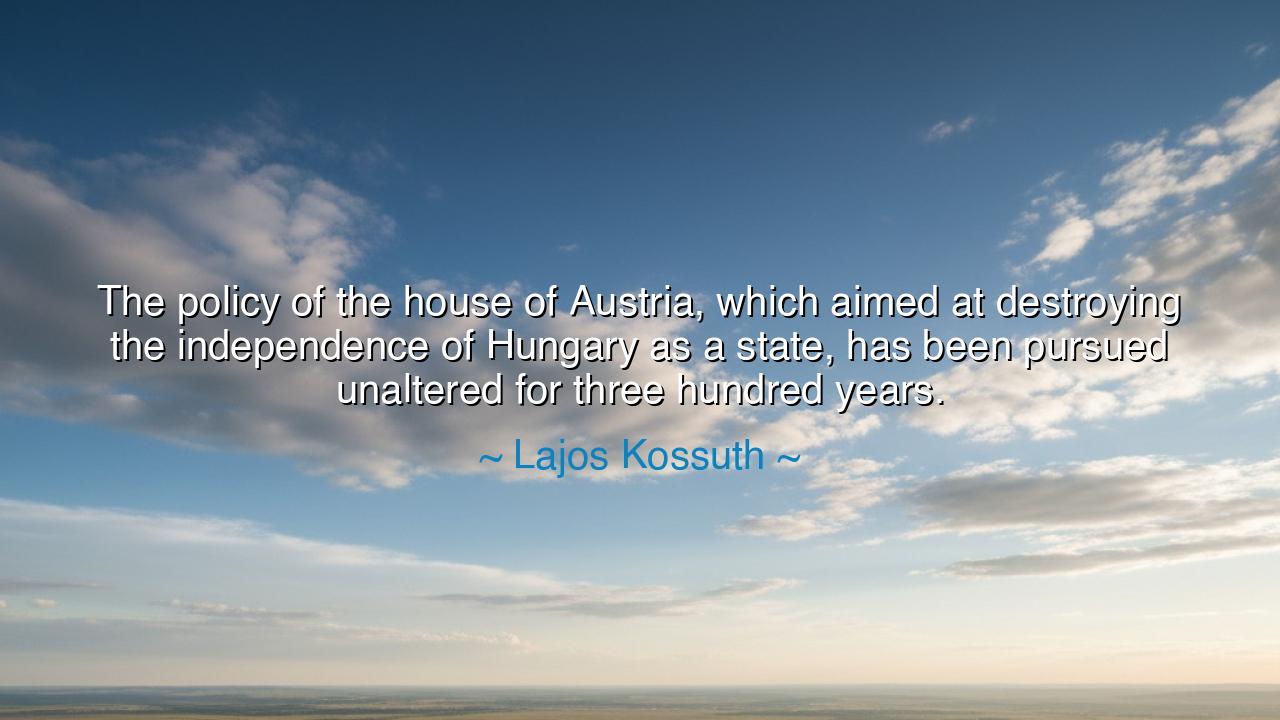
The policy of the house of Austria, which aimed at destroying the
The policy of the house of Austria, which aimed at destroying the independence of Hungary as a state, has been pursued unaltered for three hundred years.






Hear the thunderous voice of Lajos Kossuth, the flame of Hungary’s freedom, who declared: “The policy of the house of Austria, which aimed at destroying the independence of Hungary as a state, has been pursued unaltered for three hundred years.” These are words born not of mere grievance, but of a nation’s centuries-long struggle to preserve its soul. They carry the weight of suffering and the strength of remembrance. To understand them is to step into the long shadow of empires and hear the cry of a people who would not bow.
The House of Austria, known also as the Habsburg dynasty, was one of the most powerful ruling families in Europe. From their throne in Vienna, they commanded kingdoms across the continent. Yet among all the lands they ruled, Hungary stood apart — proud, stubborn, and fierce in its sense of independence. Though bound to Austria through crowns and treaties, the Hungarian heart refused to accept subjugation. Kossuth, speaking in the mid-nineteenth century, saw in the Habsburgs not new oppressors, but the continuation of an old tyranny — a dynasty whose every generation sought to tighten its grip upon Hungary’s freedom, to turn a nation into a province.
The truth of his words can be traced back to the Battle of Mohács in 1526, when the Hungarian kingdom fell under foreign control. From that day forward, the flame of independence never ceased to burn, flickering through wars, treaties, and rebellions. Each century saw the same pattern repeated: the people rose in defiance, the empire crushed them, and yet — impossibly — they endured. When Kossuth spoke of a policy “unaltered for three hundred years,” he spoke of the continuity of oppression and the continuity of resistance — a duel between tyranny and liberty that had outlived generations.
In 1848, that struggle blazed anew. The winds of revolution swept across Europe, and Hungary rose to claim its independence once more. At the head of that movement stood Lajos Kossuth — orator, patriot, visionary. He called not for vengeance, but for self-determination; not for empire, but for a nation that would govern itself in dignity. Yet, as in centuries past, Austria struck back with force, aided by the might of Russia. The Hungarian Revolution was crushed, but its spirit did not die. Kossuth was forced into exile, but his words — like the embers of a fire buried beneath ash — continued to glow in the hearts of his people.
His quote is not merely historical; it is prophetic. It reminds all nations that the struggle for freedom is never finished, for every age brings new empires and new threats to independence. Some come with armies, others with treaties, debts, or deceit — but all seek to erode the self-determination of the weak. Kossuth’s lament is also a warning: when oppression wears the mask of civilization, when tyranny speaks the language of unity, then freedom must be doubly guarded. For independence, once lost, may take centuries to regain.
Consider the lesson of Poland, divided and erased from the map by foreign powers in the same age that Hungary fought for its life. For more than a hundred years, it survived only in song, in spirit, and in memory. Yet when the moment came, the Polish nation rose again from the dust. So too, Kossuth believed, would Hungary endure — because no empire can destroy a people who refuse to forget who they are. The oppressor’s power is temporal; the oppressed people’s will is eternal.
Thus, the lesson of Kossuth’s words resounds for all time: guard your independence as sacred, for there will always be those who seek to claim it in the name of order or progress. Remember that freedom is not maintained by ease, but by vigilance; not by comfort, but by courage. The policy of oppression may persist through centuries, but so too may the resolve of those who resist it. As Kossuth’s Hungary proved, a people’s liberty may sleep beneath the chains of empire, but it never truly dies.
So, my children, take these words as both memory and prophecy: Empires rise and fall, but the desire for freedom endures. Let every generation renew its vow to defend it, for the enemies of independence are tireless — and so must we be. Let your hearts burn with the same unbroken fire that carried Kossuth through exile, that lifted Hungary through darkness, and that shall forever light the path of all who choose liberty over submission, and truth over power.






AAdministratorAdministrator
Welcome, honored guests. Please leave a comment, we will respond soon